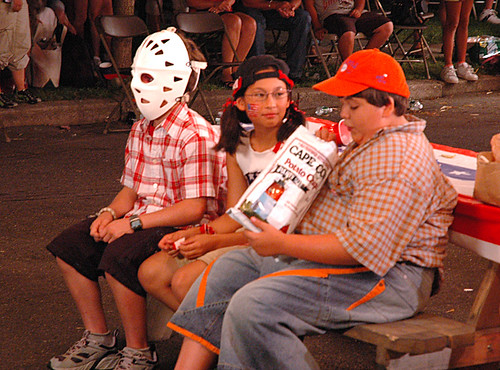Film: 12 and Holding
Rating: 5
Michael Cuesta's 12 and Holding is an island of emotional density in a sea of goofy, hackneyed coming-of-age stories. In today's world, most movies about children treat their subjects as immature, even petty in some cases. When compared to these, Cuesta's film almost seems too heavy. Not in a melodramatic way, but when most kid movies these days are rated G or PG and aren't meant for audiences older than the characters, the thematic elements here alone would probably be enough to secure an R rating.
The film, distributed by the Independent Film Channel in 2005, follows a group of three 12-year-old friends in the weeks after a fourth friend is killed in a treehouse fire. One is the victim's twin brother Jacob (Conor Donovan), who was born with a burn-like birthmark over half of his face. Another is the paternally deprived Malee (Zoe Weizenbaum), a lonely and misunderstood flautist whose mother is a psychiatrist but seems ignorant of her daughter's problems. The other is the overweight Leonard (Jesse Camacho), who survives the treehouse fire but loses his senses of smell and taste. Over the course of the film, we explore the way the characters react to the fire, and how they deal with the changes that adolescence happens to bring in its aftermath.
The stories, which are vividly dissimilar but equally fascinating, never stray from their unflinching maturity. Jacob, who had always felt treated as subordinate to his brother Rudy, has to deal not only with his own grief, but with the grief of his parents and their attempt to "replace" Rudy through adoption. Jacob visits the incarcerated local bullies who set the fire, hoping to vent his anger but instead finding something more valuable. Malee pursues a painfully unfulfillable relationship with one of her psychiatrist mother's patients (Jeremy Renner). Leonard, having lost his sense of taste, takes on a new diet and an exercise routine, much to the disapproval of his obese family.
It is a tragic shame that these three child actors have not found any more major roles. Their performances are powerful and compelling, showing understanding beyond (although only slightly beyond) their years. They are, as a matter of fact, better than the adult actors. And the adult characters are not overlooked in the screenplay. Other writers might confine the parents to one-dimensional thoughts and actions, but Anthony Cipriano gives them strong beliefs and motives, however questionable they might be in some cases, that allow them to make important contributions to the story.
The core, however, remains the children. The characters here aren't tools for the filmmakers to use for entertainment. They're people, facing significant challenges, that the filmmakers must guide through an extremely difficult time in life. They confront serious problems, with an unmistakable mixture of courage and anxiety. When they learn, they don't learn the easy way. Because the film is smart enough to know that there is no easy way to learn this stuff. The kids don't face trivial or temporary difficulties like not having a seat in the cafeteria. They aren't scared because they might get beat up at recess; they're scared because they're experiencing life. They're feeling love, and frustration, and rejection, and loss on top of it all. It is a time when you start to challenge what you've been taught. When you first start to realize that you are alone. Few coming-of-age movies have so effectively captured just how bizarre and overwhelming it is to grow up.

No comments:
Post a Comment